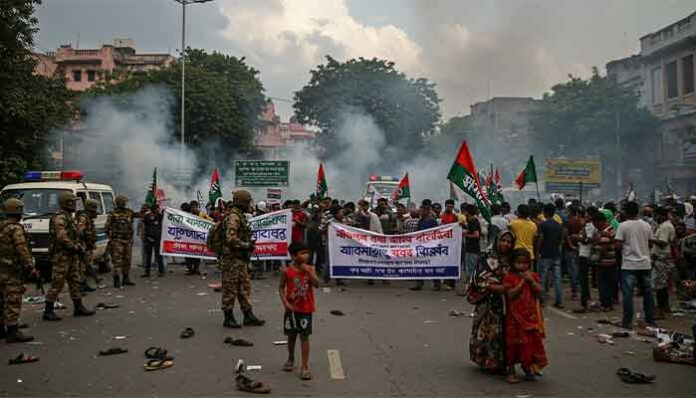Tensions Erupt in Murshidabad
Thousands gathered in Murshidabad to raise their voices, but tensions rose quickly. Police used tear gas to control the crowd, and troops were later deployed to restore order.
Law Sparks Anger Across West Bengal
In West Bengal, growing outrage over a new Muslim land law affecting Muslim-owned properties sparked unrest on the streets. As the protests escalated into violence, authorities urgently deployed troops to calm tensions and prevent further harm.
Protests Turn Deadly
Thousands gathered in Murshidabad on Friday, their voices echoing with anger and concern. As tensions escalated, police resorted to tear gas to disperse the crowd. By Saturday, the sorrowful truth emerged, three people had lost their lives, including an innocent child.
Dozens Arrested, Officers Injured
Jawed Shamim, a official senior police, reported that 118 people have been taken into custody over the recent unrest. He added that at least 15 officers were injured while trying to manage the volatile situation.
What Triggered the Unrest?
Earlier this month, the Waqf Amendment Bill, widely referred to as the Muslim Land Law by critics and protestors, was pushed through after heated discussions, prompting widespread demonstrations and revealing strong public opposition.
Waqf Boards: A Powerful Landholding Force
With nearly 900,000 acres under their care, India’s Waqf boards—around two dozen in number, hold one of the largest land portfolios in the country, on par with the military and Indian Railways.
Government Defends the Bill
Aiming to bring greater transparency and efficiency, Minister Kiren Rijiju said the bill—introduced on Wednesday, seeks to tackle corruption and improve overall governance.
Concerns Over Misuse of Community Property
Expressing concern over the misuse of community-held properties, Home Minister Amit Shah, one of Prime Minister Modi’s closest allies, said the new amendments aim to stop individuals from turning public assets into personal profit.
He emphasized that funds meant to uplift minority communities are being unfairly diverted.
Debate Over Non-Muslims in Waqf Boards
While the new bill allows non-Muslims to join Waqf boards in limited administrative capacities, Amit Shah emphasized their role would not extend beyond that.
Meanwhile, opposition leaders argue the decision could further widen communal divides and sideline the concerns of the country’s vast Muslim population of 200 million.
Transparency or Targeting?
The government says the reforms aim to ensure that Waqf boards, responsible for overseeing vast lands donated for the welfare of Muslim communities, manage these assets more openly and transparently.
Opposition Accuses Government of Playing Politics
Critics from the opposition believe, in fact, the bill is less about governance and more about politics. They argue that, moreover, Modi’s BJP is leveraging the move to strengthen ties with hardline Hindu groups at the same time, it is doing so at the cost of further alienating India’s Muslim minority.
Modi Calls It a Landmark Moment
Prime Minister Modi described the bill’s passage as a “watershed moment,” marking it as a key turning point that, in his view, will help shape the direction of India’s future.
Rahul Gandhi’s Warning
Rahul Gandhi strongly criticized the bill; specifically, he stated that it unfairly focuses on Muslims now. Moreover, it creates a risky framework that could, in the future, be used to single out other communities later on.
Modi’s Image as a Hindu Nationalist Leader
Over the years, Modi has shaped his leadership style around a strong alignment with Hindu-majority ideals, presenting himself as a committed voice for their beliefs and cultural identity.
Past Controversies Under Modi’s Rule
Under Modi’s leadership, Jammu and Kashmir, home to a Muslim majority, lost its constitutional autonomy. The move triggered unrest and left lasting effects on the region.
His government also backed the construction of a Hindu temple on the site of a centuries-old mosque. That mosque had been demolished by a mob in 1992.

